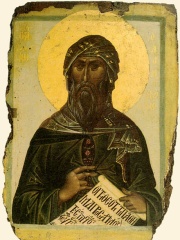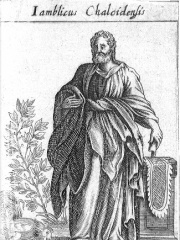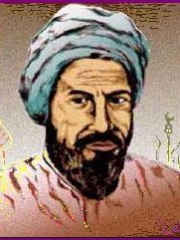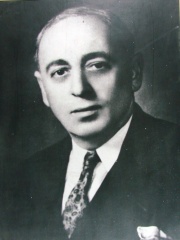




The Most Famous
PHILOSOPHERS from Syria
This page contains a list of the greatest Syrian Philosophers. The pantheon dataset contains 1,267 Philosophers, 6 of which were born in Syria. This makes Syria the birth place of the 29th most number of Philosophers behind Ireland, and Romania.
Top 6
The following people are considered by Pantheon to be the most legendary Syrian Philosophers of all time. This list of famous Syrian Philosophers is sorted by HPI (Historical Popularity Index), a metric that aggregates information on a biography's online popularity.

1. John of Damascus (676 - 749)
With an HPI of 79.22, John of Damascus is the most famous Syrian Philosopher. His biography has been translated into 66 different languages on wikipedia.
John of Damascus or John Damascene, born Yūḥana ibn Manṣūr ibn Sarjūn, was a Christian monk, priest, hymnographer, and apologist. He was born and raised in Damascus c. AD 675 or AD 676; the precise date and place of his death is not known, though tradition places it at his monastery, Mar Saba, near Jerusalem, on 4 December AD 749. A polymath whose fields of interest and contribution included law, theology, philosophy, and music, he was given the by-name of Chrysorroas (Χρυσορρόας, literally "streaming with gold", i.e. "the golden speaker"). He wrote works expounding the Christian faith, and composed hymns which are still used both liturgically in Eastern Christian practice throughout the world as well as in western Lutheranism at Easter. He is one of the Fathers of the Eastern Orthodox Church and is best known for his strong defence of icons. The Catholic Church regards him as a Doctor of the Church, often referred to as the Doctor of the Assumption due to his writings on the Assumption of Mary. He was also a prominent exponent of perichoresis, and employed the concept as a technical term to describe both the interpenetration of the divine and human natures of Christ and the relationship between the hypostases of the Trinity. John is at the end of the Patristic period of dogmatic development, and his contributions are the last ones in the series of theological developments before the medieval period. In Catholic theology, he is therefore known as the "last of the Greek Fathers". The main source of information for the life of John of Damascus is a work attributed to one John of Jerusalem, identified therein as the Patriarch of Jerusalem. This is an excerpted translation into Greek of an earlier Arabic text. The Arabic original contains a prologue not found in most other translations, and was written by an Arab monk, Michael, who explained that he decided to write his biography in 1084 because none was available in his day. However, the main Arabic text seems to have been written by an unknown earlier author sometime between the early 9th and late 10th century. Written from a hagiographical point of view and prone to exaggeration and some legendary details, it is not the best historical source for his life, but is widely reproduced and considered to contain elements of some value. The hagiographic novel Barlaam and Josaphat is a work of the 10th century attributed to a monk named John. It was only considerably later that the tradition arose that this was John of Damascus, but most scholars no longer accept this attribution. Instead much evidence points to Euthymius of Athos, a Georgian who died in 1028.

2. Iamblichus (245 - 330)
With an HPI of 72.85, Iamblichus is the 2nd most famous Syrian Philosopher. His biography has been translated into 45 different languages.
Iamblichus ( eye-AM-blik-əs; Ancient Greek: Ἰάμβλιχος, romanized: Iámblichos; Aramaic: 𐡉𐡌𐡋𐡊𐡅, romanized: Yamlīkū; c. 245 – c. 325) was a Syrian Arab Neoplatonist philosopher who determined a direction later taken by Neoplatonism. Iamblichus was also the biographer of the Greek mystic, philosopher, and mathematician Pythagoras. In addition to his philosophical contributions, his Protrepticus is important for the study of the sophists because it preserved about ten pages of an otherwise unknown sophist known as the Anonymus Iamblichi.

3. Ibn al-Nafis (1212 - 1289)
With an HPI of 71.41, Ibn al-Nafis is the 3rd most famous Syrian Philosopher. His biography has been translated into 46 different languages.
ʿAlāʾ al-Dīn Abū al-Ḥasan ʿAlī ibn Abī Ḥazm al-Qarashī (Arabic: علاء الدين أبو الحسن عليّ بن أبي حزم القرشي ), known as Ibn al-Nafīs (Arabic: ابن النفيس), was an Arab polymath whose areas of work included medicine, surgery, physiology, anatomy, biology, Islamic studies, jurisprudence, and philosophy. He is known for being the first to describe the pulmonary circulation of the blood. The work of Ibn al-Nafis regarding the right sided (pulmonary) circulation pre-dates the later work (1628) of William Harvey's De motu cordis. Both theories attempt to explain circulation. The 2nd century Greek physician Galen's theory about the physiology of the circulatory system remained unchallenged until the works of Ibn al-Nafis, who has therefore been described as "the father of circulatory physiology". As an early anatomist, Ibn al-Nafis also performed several human dissections during the course of his work, making several important discoveries in the fields of physiology and anatomy. Besides his famous discovery of the pulmonary circulation, he also gave an early insight of the coronary and capillary circulations. He was also appointed as the chief physician at al-Naseri Hospital founded by Sultan Saladin. Due to his discoveries, he has been described by some as “the second Avicenna”. Apart from medicine, Ibn al-Nafis studied jurisprudence, literature and theology. He was an expert on the Shafi'i school of jurisprudence and an expert physician. The number of medical textbooks written by Ibn al-Nafis is estimated at more than 110 volumes.

4. Damascius (480 - 550)
With an HPI of 68.64, Damascius is the 4th most famous Syrian Philosopher. His biography has been translated into 33 different languages.
Damascius (; Ancient Greek: Δαμάσκιος; c. 462 – after 538), known as "the last of the Athenian Neoplatonists", was the last scholarch of the neoplatonic Athenian school. He was one of the neoplatonic philosophers who left Athens after laws confirmed by emperor Justinian I forced the closure of the Athenian school in c. 529 AD. After he left Athens, he may have sought refuge in the court of the Persian King Chrosroes, before being allowed back into the Byzantine Empire. His surviving works consist of three commentaries on the works of Plato, and a metaphysical text entitled Difficulties and Solutions of First Principles.

5. Zaki al-Arsuzi (1899 - 1968)
With an HPI of 65.18, Zaki al-Arsuzi is the 5th most famous Syrian Philosopher. His biography has been translated into 21 different languages.
Zaki al-Arsuzi (Arabic: زكي الأرسوزي, romanized: Zakī al-Arsūzī; June 1899 – 2 July 1968) was a Syrian philosopher, philologist, sociologist, historian, and Arab nationalist. His ideas played a significant role in the development of Ba'athism and its political movement. He published several books during his lifetime, most notably The Genius of Arabic in its Tongue (1943). Born into a middle-class Alawite family in Latakia, Syria, al-Arsuzi studied at the Sorbonne, where he became interested in nationalism. In 1930, he returned to Syria, where he became a member of the League of National Action (LNA) in 1933. In 1938, he moved to Damascus because of his disillusionment with party work, and in 1939, he left the LNA. In Damascus al-Arsuzi established and headed a group consisting of mostly secondary school pupils who would often discuss European history, nationalism and philosophy. Shortly after leaving the LNA, al-Arsuzi established the Arab National Party, an Arab nationalist party with a "defined creed". It was not a success and, on his return to Syria in November 1940 after a brief stay in Baghdad, al-Arsuzi established a new party, the Arab Ba'ath; by 1944, however, most of its members had left and joined Michel Aflaq's and Salah al-Din al-Bitar's Arab Ba'ath Movement, which subscribed to a nearly identical doctrine. In 1947, the two movements merged, forming a single Arab Ba'ath Party. Despite the merger, Al-Arsuzi neither attended its founding conference nor was given membership. During the rest of the 1940s and 1950s, al-Arsuzi stayed out of politics and worked as a teacher. He made a comeback during the 1960s power struggle in the Ba'ath Party between Aflaq and al-Bitar on one hand and Salah Jadid and Hafez al-Assad on the other. When Aflaq and al-Bitar lost the power struggle and were forced to escape from Syria in 1966, al-Arsuzi replaced Aflaq as the main ideologue of the Syrian-led faction of the Ba'ath Party (Neo-Ba'athist) Al-Arsuzi's theories about society, language and nationalism, which are collectively part of Ba'athist thought, hold that the Arab Nation will be unified when the Arab people reestablish the Arab identity they have lost over the past 1000 years. The key to Arab unification, according to al-Arsuzi, is through language. In contrast to the Latin language, al-Arsuzi argued, Arabic was far less arbitrary and far more intuitive. Despite his contributions to Ba'athist thought, al-Arsuzi is barely mentioned in Western or Arab scholarship. This omission may be linked to the fact that Sati' al-Husri, a contemporary Arab nationalist, had many of the same ideas as al-Arsuzi but was better able to articulate them.

6. Numenius of Apamea (200 - 200)
With an HPI of 62.99, Numenius of Apamea is the 6th most famous Syrian Philosopher. His biography has been translated into 25 different languages.
Numenius of Apamea (Ancient Greek: Νουμήνιος ὁ ἐξ Ἀπαμείας, Noumēnios ho ex Apameias; Latin: Numenius Apamensis) was a Greek philosopher, who lived in Rome, and flourished during the latter half of the 2nd century AD. He was a Neopythagorean and forerunner of the Neoplatonists.
People
Pantheon has 6 people classified as Syrian philosophers born between 200 and 1899. Of these 6, none of them are still alive today. The most famous deceased Syrian philosophers include John of Damascus, Iamblichus, and Ibn al-Nafis.
Deceased Syrian Philosophers
Go to all RankingsJohn of Damascus
676 - 749
HPI: 79.22
Iamblichus
245 - 330
HPI: 72.85
Ibn al-Nafis
1212 - 1289
HPI: 71.41
Damascius
480 - 550
HPI: 68.64
Zaki al-Arsuzi
1899 - 1968
HPI: 65.18
Numenius of Apamea
200 - 200
HPI: 62.99

